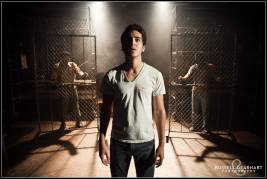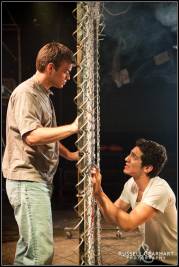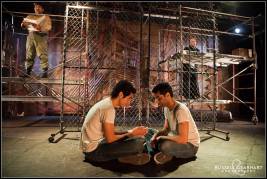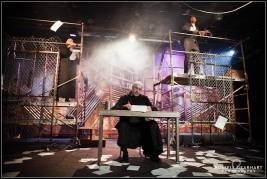NOT RECOMMENDED
In 2005, the Western world recoiled in horror at photos of Iranian teenagers Mahmoud Asgari and Ayaz Marhoni, hangman’s nooses around their necks, about to be put to death for, it was reported at the time, the crime of consensual homosexual acts.
Haram Iran is Chicago attorney Jay Paul Deratany’s attempt to depict the events leading up to this atrocity. Following a world premiere Windy City engagement in 2008, Haram Iran now gets its first West Coast production at the Celebration Theatre. Sadly, even the best efforts of Michael Matthews (one of L.A.’s premier directorial talents) and a committed team of actors and designers cannot make of Deratany’s play anything other than a poorly written melodrama based as much on the author’s conjecture as on facts reported about the case.
That Iran, like Saudi Arabia and Uganda, is a country where gay sex may have dire, even fatal legal consequences is indisputable. There is considerable dispute, however, about the Asgar/Marhoni case. Human Rights Watch has stated, “There is no evidence that this was a consensual act,” and observed that “The bulk of evidence suggests that the youths were tried on allegations of raping a 13-year-old, with the suggestion that they were tried for consensual homosexual conduct seemingly based almost entirely on mistranslations and on cursory news reporting magnified by the Western press.” Unfortunately, even though Deratany’s scenario may possibly be the correct one, anyone seeing Haram Iran will likely conclude that it is the only one.
Great plays, books, and films have been written about atrocities. Martin Sherman’s Bent, about the persecution of gays in Nazi Germany, is just such a play. Both the novel and film adaptation of Khaled Hosseini’s The Kite Runner are dramatic yet nuanced looks at the horrors of life in Afghanistan under the rule of the Taliban. Haram Iran’s mix of stilted, expository dialog and colloquial American speech delivered by actors assuming thick foreign accents lacks those qualities which make Bent and The Kite Runner great.
In Deratamy’s play, Ayaz (Tamer Aziz) is a sensitive, book-reading 15-year-old more interested in learning English and discovering the world outside Iran than he is in playing soccer with neighborhood youths Mahmoud (Narendra “Andy” Gala) or Fareed (Michael Tauzin). In fact, he gets pretty tired of hearing Fareed make list upon list of all the things that are “haram” (forbidden) under sharia (Islamic) law. Mahmoud is torn between his desire to play soccer with Fareed or to learn about the West with Ayaz, but as Ayaz shows him his copies of National Geographic and English language novels and begins to tell him the story of Catcher In The Rye’s Holden Caulfield, Mahmoud finds himself seduced, not only by J.D. Salinger’s young hero but by the physical presence of Ayaz. In scenes which play like an Iranian Beautiful Thing, though without Jonathan Harvey’s gift for believable dialog, the two boys bond. In a plotline seemingly entirely the fruit of Deratany’s imagination, Haram Iran transforms Fareed into a jealous, vengeful third wheel, who upon discovering Ayad applying balm to wounds administered to Mahmoud by his brutal father (again Beautiful Thing), decides to get revenge by turning the boys in.
Conveniently, if improbably, Fareed’s physically abusive father (Sila Agavale) happens to be a jailer who takes it upon himself to rape Ayaz, the better to prove that he’s not the innocent lad he pretends to be (shades of last year’s Women Behind Bars, but without the intentional laughs).
Meanwhile, Ayaz’s Paris-educated mother (Anoush NeVart), who put all these subversive ideas into her son’s head when she introduced him to Victor Hugo’s Les Miz, goes to bat for her son, enlisting lawyer Rezazedeh (Ayman Samman) to defend him in what turns out to be a kangaroo court. The Mullah of Mashhad (Maz Siam) assigned with passing judgment on the boys, will hear nothing of Mrs. Marhoni’s case, and when street protests erupt, enlists the jailer’s help in forcing his son to cry rape. Though horrendous miscarriages of justice are undeniably a daily occurrence in today’s Iran, the Mullah (and in fact all of Haram Iran’s villains) are painted so unremittingly evil that they come across close to caricature.
Even a director as gifted as Matthews cannot make great theater out of a committed social activist’s mediocre script (and its endless references to Catcher In The Rye).
It’s hard to evaluate the cast’s performances, as each has been saddled not only with improbable dialog, but with the foreign accent of an Iranian speaking English as a second language. Just as the characters in Bent should not be played with German accents, or for that matter The Sound Of Music’s Trapp Family with Austrian ones, neither should Haram Iran’s actors assume Persian (or pseudo Persian) accents. The result not only creates characters who come across as “foreign,” but makes the actors’ efforts to breathe reality into Deratany’s dialog a pretty much insurmountable one.
Then there’s the matter of casting actors who simply cannot be believable as 14 or 15-year-olds. The horror of this case is not so much that its victims may or may not have been executed for homosexual activity, but that they were mere children at the time. Though Aziz looks like the teenager that he still is, he can’t pass for 15, and Gala and Tauzin even less so. Clearly these are not roles to be played by 15-year-old actors, but they need to be played by actors who can be convincing as boys in their mid-teens. Though the casting process was doubtless a tough one given the nature of the piece and the possible resistance of Middle Eastern actors to play gay characters, at least two-thirds of the casting here doesn’t work because, simply put, it blunts the atrocity of putting children to death. (That being said, I’d very much like to see Aziz and Gala’s work again, as well as that of StageSceneLA favorite Tauzin.)
Kurt Boetcher’s exciting, versatile chain-link set design is just what we’ve come to expect from this young talent, and Tim Swiss’s lighting is his usual terrific work. Naila Sanders’ costumes are appropriately realistic. Cricket S. Myers’ sound design works well with the exception of some overly melodramatic background music.
Human rights issues in Iran deserve a great play to be written about them, and Michael Matthews deserves a great play to direct, one at the level of his talents. The cast too deserve better than Haram Iran. So does the Celebration Theatre.
Celebration Theatre, 7051B Santa Monica Blvd., Hollywood.
www.celebrationtheatre.com
–Steven Stanley
March 11, 2010
Photos: Russell Gearhart






 Since 2007, Steven Stanley's StageSceneLA.com has spotlighted the best in Southern California theater via reviews, interviews, and its annual StageSceneLA Scenies.
Since 2007, Steven Stanley's StageSceneLA.com has spotlighted the best in Southern California theater via reviews, interviews, and its annual StageSceneLA Scenies.







 COPYRIGHT 2024 STEVEN STANLEY :: DESIGN BY
COPYRIGHT 2024 STEVEN STANLEY :: DESIGN BY